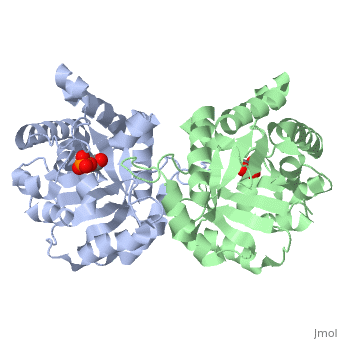Sandbox Reserved 806
From Proteopedia
| Line 4: | Line 4: | ||
<Structure load='2ypi' size='500' frame='true' align='right' caption='Triosephosphate Isomerase' scene='Insert optional scene name here' /> | <Structure load='2ypi' size='500' frame='true' align='right' caption='Triosephosphate Isomerase' scene='Insert optional scene name here' /> | ||
==Introduction== | ==Introduction== | ||
| - | This is Triosephosphate isomerase, an enzyme in the glycolytic pathway. It is a dimer, but can function as a | + | This is <scene name='56/563218/Full_tim_rainbow/1'>Triosephosphate isomerase</scene>, an enzyme in the glycolytic pathway. It is a dimer, but can function as a |
<scene name='56/563218/Tim_rainbow/1'>monomer</scene>. It catalyzes the reaction of D-glyceraldehyde 3-phosphate to glycerone phosphate. The ligand that binds to it is called 2-Phosphoglycolic acid (PGA). | <scene name='56/563218/Tim_rainbow/1'>monomer</scene>. It catalyzes the reaction of D-glyceraldehyde 3-phosphate to glycerone phosphate. The ligand that binds to it is called 2-Phosphoglycolic acid (PGA). | ||
Revision as of 18:39, 16 October 2013
| This Sandbox is Reserved from Oct 10, 2013, through May 20, 2014 for use in the course "CHEM 410 Biochemistry 1 and 2" taught by Hanna Tims at the Messiah College. This reservation includes Sandbox Reserved 780 through Sandbox Reserved 807. |
To get started:
More help: Help:Editing |
|
Contents |
Introduction
This is , an enzyme in the glycolytic pathway. It is a dimer, but can function as a . It catalyzes the reaction of D-glyceraldehyde 3-phosphate to glycerone phosphate. The ligand that binds to it is called 2-Phosphoglycolic acid (PGA).
3D Structure
The contains alpha helices (gold) and beta sheets (purple). Overall, it forms a beta barrel motif.
was not working.
Residues
Pictured in yellow are the . The are pictured in green.
Solvent Accessibility
are pictured in dark blue. They are mostly located between the beta sheets and alpha helices, in a diagonal line, closer to where the monomers connect to form a dimer.
Ligand Interaction Site
The ligand--PGA-- with the molecule at the location pictured. The that are 4 Å or less from the ligand, are pictured in green.

